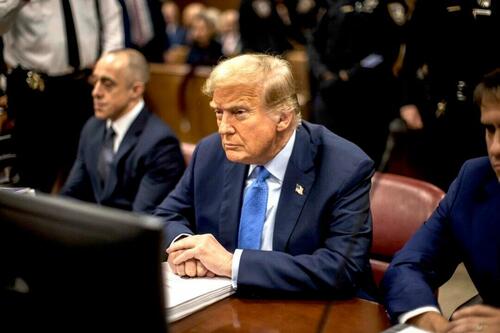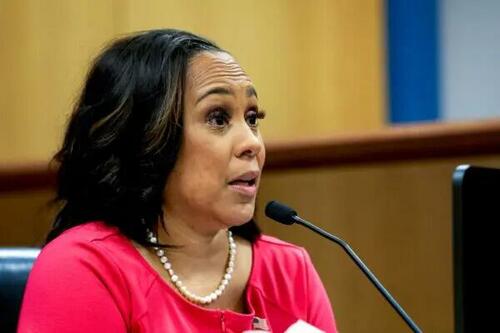
Authored by Sam Dorman via The Epoch Times,
The Supreme Court indicated on April 25 that it would issue a narrow ruling refining the scope of presidential immunity while leaving the details of former President Donald Trump’s other legal battles up to lower courts.
The most immediate effect of their decision on President Trump’s legal battles would be to delay his Washington case, where his immunity appeal originated. That trial was scheduled to start on March 4 but, more recently, observers have been questioning whether it will even start before the election.
Sending the case back to D.C. District Judge Tanya Chutkan would presumably force her to continue pre-trial proceedings with an added layer: Determining how to square Special Counsel Jack Smith’s indictment with the Supreme Court’s new definition of immunity.
Based on their April 25 questions, the justices are expected to distinguish between official and unofficial acts while ruling that presidents enjoy some immunity for the official ones. But it’s unclear how specific they will be in their description and whether they'll provide enough instructions for the lower court to avoid yet another appeal that could once again reach the Supreme Court.
“The Supreme Court could remand the immunity case with very little, if any, instruction, let the district court come up with its opinion, and then let the appellate court deal with it again,” John Shu, a constitutional law expert who served in both Bush administrations, told The Epoch Times. He added, “I certainly hope that doesn’t happen, because we’d end up right where we are today.”
Even if the case does proceed to trial, it’s questionable how effective it will be without some of the indicted actions that President Trump’s attorney, D. John Sauer, said were private and therefore outside the scope of immunity. Michael Dreeben, who argued for Mr. Smith, said the Justice Department was willing to proceed with a weakened indictment.
Perhaps previewing the court’s opinion, Chief Justice John Roberts worried that without official acts, the trial court may be proceeding with a “one-legged stool.” Mr. Sauer responded that he didn’t think the case “would be able to go forward.”
Mark Miller, senior counsel at the Pacific Legal Foundation, told The Epoch Times that Justice Roberts could require a special interrogatory verdict form in which the jury is asked to distinguish between official and nonofficial conduct in weighing President Trump’s case.
State of Trump’s Other Cases
It’s difficult to predict how the court’s decision would impact President Trump’s other ongoing criminal cases. Their future may hinge on the justices’ particular phrasing rather than merely distinguishing between official and non-official acts.
The Georgia election case is the most likely to be impacted by the decision since the accusations are most similar to the Washington trial, which will likely loom large in the justices’ deliberations.
But as the court indicated, their eventual opinion will have long-lasting impacts on other cases. “We’re writing a rule for the ages,” Justice Neil Gorsuch told Mr. Dreeben. The opinion would presumably ripple through multiple levels of the justice system as well. In an exchange with Justice Amy Coney Barrett, Mr. Dreeben acknowledged that immunity would apply to both state and federal prosecutions.
On the day of the oral argument, President Trump was facing state charges related to his purported attempt to influence the 2016 presidential election with a “hush money” payment to adult film actress Stephanie Clifford. In that case, he tried raising presidential immunity as a reason to exclude certain evidence since it came from his official communications channels as president.
New York Judge Juan Merchan said the motion was filed too late but it nevertheless highlighted the complicated nature of President Trump’s cases as they relate to immunity. While the alleged payment to Ms. Clifford, also known as Stormy Daniels, was made before the election, the purported falsification of documents didn’t occur until after he took office.
President Trump theoretically could appeal a conviction in New York based on the Supreme Court’s decision. It’s unclear, however, whether the payments would fall under the type of immunity that the Supreme Court eventually granted.
Fulton County District Attorney Fani Willis testifies during a hearing in the case of the State of Georgia v. Donald John Trump at the Fulton County Courthouse in Atlanta on Feb. 15, 2024. (Alyssa Pointer/Pool via Getty Images)
Fulton County District Attorney Fani Willis requested the Georgia trial start in August but that seemed increasingly unlikely after information surfaced about her affair with Nathan Wade, one of her top prosecutors.
“That’s not even going to ... start before the election,” Article III Project senior counsel Will Chamberlain told The Epoch Times.
Kevin O'Brien, a former assistant U.S. attorney, similarly told The Epoch Times that “no one” knows when the Georgia trial will start. “Even under the best of circumstances, it wasn’t going to start until next year,” he said.
Post-Election Fallout
If the Georgia trial proceeded, Fulton County Judge Scott McAfee would presumably need to parse out that indictment like Judge Chutkan would with the one in Washington.
Besides President Trump, more than a dozen others were named in the Georgia indictment. Those included former aides like former White House Chief of Staff Mark Meadows. Experts like South Texas College of Law Professor Josh Blackman and Mr. Chamberlain suggested it was unlikely the immunity decision would afford substantial protection to defendants other than President Trump.
Mr. Meadows filed an amicus brief in which he told the Supreme Court that the Supremacy Clause of the Constitution made him immune from charges in Fulton County because they “arise from his official acts as Chief of Staff.” It’s unclear how the court will rule or affirm criminal immunity for advisers, if at all.
“The Court should therefore take care to ensure that it leaves intact the robust immunity from state prosecution afforded under the Supremacy Clause, particularly as it relates to subordinate federal officials,” he said.
Then-White House Chief of Staff Mark Meadows talks to reporters at the White House in Washington, on Oct. 21, 2020. (Tasos Katopodis/Getty Images)
President Trump’s remaining federal case in Florida involves his handling of classified documents and was initially scheduled to start on May 20, but that appeared to be in limbo. The Supreme Court is expected to issue an opinion in June, meaning that a delayed trial in Florida could see an attempt by President Trump to raise legal arguments from the justices’ opinions.
As in the New York case, it appeared that President Trump could appeal a would-be conviction depending on the scope of immunity provided by the Supreme Court’s decision. “It would definitely impact [the Florida and Georgia cases] because both of those deal with what Trump and his lawyers would argue are official acts,” constitutional attorney Gayle Trotter told The Epoch Times.
In February, President Trump asked Florida Judge Aileen Cannon to dismiss 32 counts in his indictment based on presidential immunity. She has yet to issue a decision on that motion.
Regardless of how the justices rule on immunity, oral argument raised the prospect that presidents can override the effects of state and federal prosecutions by pardoning themselves.
Assuming any of his trials extend past his would-be inauguration, it’s questionable whether he could use his pardon authority on himself.
Justice Gorsuch noted that “happily,” the question of a president’s self-pardoning “has never been presented to us.” Mr. Dreeben told the court: “I don’t believe the Department of Justice has taken a position [on self-pardoning]. The only authority that I’m aware of is a member of the Office of Legal Counsel wrote on a memorandum that there is no self-pardon authority. As far as I know, the Department has not addressed it further.”
Authored by Sam Dorman via The Epoch Times,
The Supreme Court indicated on April 25 that it would issue a narrow ruling refining the scope of presidential immunity while leaving the details of former President Donald Trump’s other legal battles up to lower courts.
The most immediate effect of their decision on President Trump’s legal battles would be to delay his Washington case, where his immunity appeal originated. That trial was scheduled to start on March 4 but, more recently, observers have been questioning whether it will even start before the election.
Sending the case back to D.C. District Judge Tanya Chutkan would presumably force her to continue pre-trial proceedings with an added layer: Determining how to square Special Counsel Jack Smith’s indictment with the Supreme Court’s new definition of immunity.
Based on their April 25 questions, the justices are expected to distinguish between official and unofficial acts while ruling that presidents enjoy some immunity for the official ones. But it’s unclear how specific they will be in their description and whether they’ll provide enough instructions for the lower court to avoid yet another appeal that could once again reach the Supreme Court.
“The Supreme Court could remand the immunity case with very little, if any, instruction, let the district court come up with its opinion, and then let the appellate court deal with it again,” John Shu, a constitutional law expert who served in both Bush administrations, told The Epoch Times. He added, “I certainly hope that doesn’t happen, because we’d end up right where we are today.”
Even if the case does proceed to trial, it’s questionable how effective it will be without some of the indicted actions that President Trump’s attorney, D. John Sauer, said were private and therefore outside the scope of immunity. Michael Dreeben, who argued for Mr. Smith, said the Justice Department was willing to proceed with a weakened indictment.
Perhaps previewing the court’s opinion, Chief Justice John Roberts worried that without official acts, the trial court may be proceeding with a “one-legged stool.” Mr. Sauer responded that he didn’t think the case “would be able to go forward.”
Mark Miller, senior counsel at the Pacific Legal Foundation, told The Epoch Times that Justice Roberts could require a special interrogatory verdict form in which the jury is asked to distinguish between official and nonofficial conduct in weighing President Trump’s case.
State of Trump’s Other Cases
It’s difficult to predict how the court’s decision would impact President Trump’s other ongoing criminal cases. Their future may hinge on the justices’ particular phrasing rather than merely distinguishing between official and non-official acts.
The Georgia election case is the most likely to be impacted by the decision since the accusations are most similar to the Washington trial, which will likely loom large in the justices’ deliberations.
But as the court indicated, their eventual opinion will have long-lasting impacts on other cases. “We’re writing a rule for the ages,” Justice Neil Gorsuch told Mr. Dreeben. The opinion would presumably ripple through multiple levels of the justice system as well. In an exchange with Justice Amy Coney Barrett, Mr. Dreeben acknowledged that immunity would apply to both state and federal prosecutions.
On the day of the oral argument, President Trump was facing state charges related to his purported attempt to influence the 2016 presidential election with a “hush money” payment to adult film actress Stephanie Clifford. In that case, he tried raising presidential immunity as a reason to exclude certain evidence since it came from his official communications channels as president.
New York Judge Juan Merchan said the motion was filed too late but it nevertheless highlighted the complicated nature of President Trump’s cases as they relate to immunity. While the alleged payment to Ms. Clifford, also known as Stormy Daniels, was made before the election, the purported falsification of documents didn’t occur until after he took office.
President Trump theoretically could appeal a conviction in New York based on the Supreme Court’s decision. It’s unclear, however, whether the payments would fall under the type of immunity that the Supreme Court eventually granted.
Fulton County District Attorney Fani Willis testifies during a hearing in the case of the State of Georgia v. Donald John Trump at the Fulton County Courthouse in Atlanta on Feb. 15, 2024. (Alyssa Pointer/Pool via Getty Images)
Fulton County District Attorney Fani Willis requested the Georgia trial start in August but that seemed increasingly unlikely after information surfaced about her affair with Nathan Wade, one of her top prosecutors.
“That’s not even going to … start before the election,” Article III Project senior counsel Will Chamberlain told The Epoch Times.
Kevin O’Brien, a former assistant U.S. attorney, similarly told The Epoch Times that “no one” knows when the Georgia trial will start. “Even under the best of circumstances, it wasn’t going to start until next year,” he said.
Post-Election Fallout
If the Georgia trial proceeded, Fulton County Judge Scott McAfee would presumably need to parse out that indictment like Judge Chutkan would with the one in Washington.
Besides President Trump, more than a dozen others were named in the Georgia indictment. Those included former aides like former White House Chief of Staff Mark Meadows. Experts like South Texas College of Law Professor Josh Blackman and Mr. Chamberlain suggested it was unlikely the immunity decision would afford substantial protection to defendants other than President Trump.
Mr. Meadows filed an amicus brief in which he told the Supreme Court that the Supremacy Clause of the Constitution made him immune from charges in Fulton County because they “arise from his official acts as Chief of Staff.” It’s unclear how the court will rule or affirm criminal immunity for advisers, if at all.
“The Court should therefore take care to ensure that it leaves intact the robust immunity from state prosecution afforded under the Supremacy Clause, particularly as it relates to subordinate federal officials,” he said.
Then-White House Chief of Staff Mark Meadows talks to reporters at the White House in Washington, on Oct. 21, 2020. (Tasos Katopodis/Getty Images)
President Trump’s remaining federal case in Florida involves his handling of classified documents and was initially scheduled to start on May 20, but that appeared to be in limbo. The Supreme Court is expected to issue an opinion in June, meaning that a delayed trial in Florida could see an attempt by President Trump to raise legal arguments from the justices’ opinions.
As in the New York case, it appeared that President Trump could appeal a would-be conviction depending on the scope of immunity provided by the Supreme Court’s decision. “It would definitely impact [the Florida and Georgia cases] because both of those deal with what Trump and his lawyers would argue are official acts,” constitutional attorney Gayle Trotter told The Epoch Times.
In February, President Trump asked Florida Judge Aileen Cannon to dismiss 32 counts in his indictment based on presidential immunity. She has yet to issue a decision on that motion.
Regardless of how the justices rule on immunity, oral argument raised the prospect that presidents can override the effects of state and federal prosecutions by pardoning themselves.
Assuming any of his trials extend past his would-be inauguration, it’s questionable whether he could use his pardon authority on himself.
Justice Gorsuch noted that “happily,” the question of a president’s self-pardoning “has never been presented to us.” Mr. Dreeben told the court: “I don’t believe the Department of Justice has taken a position [on self-pardoning]. The only authority that I’m aware of is a member of the Office of Legal Counsel wrote on a memorandum that there is no self-pardon authority. As far as I know, the Department has not addressed it further.”
Loading…





